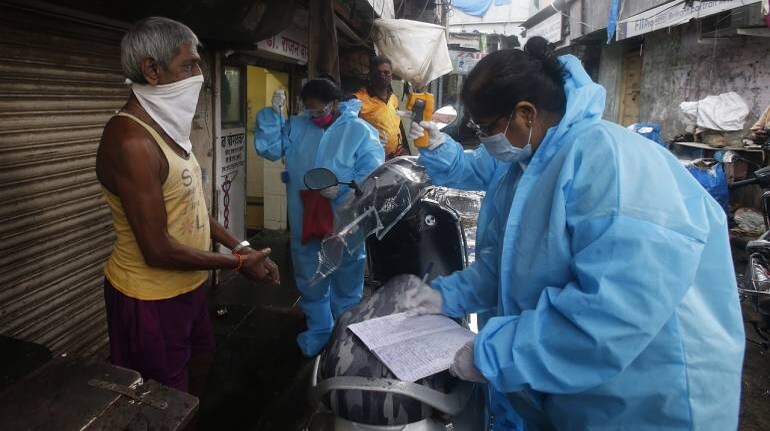The exercise was undertaken in the first week of August for a comprehensive assessment of the COVID-19 situation in Delhi and to formulate strategies based on its findings.
Anti-bodies against COVID-19 infection have been found in 29.1 percent people in the latest sero-prevalence survey in the national capital, Delhi Health Minister Satyendar Jain said on August 20.
Interacting with reporters, he said, 15,000 representative samples were taken in the August 1-7 survey from 11 districts, and the next exercise will begin from September 1.
"In the previous survey, it was found that over 22 percent people had developed anti-bodies. Now, the August survey shows it is 29.1 percent, meaning they had got infected and recovered," Jain said. He added that this means out of 2 crore population of Delhi, nearly 59 lakh have recovered from coronavirus infection and developed anti-bodies.
The minister also said prevalence of anti-bodies found in males was 28.3 percent, and in females 32.2 percent in the latest survey.
The previous sero-prevalance survey 21, done from June 27-July 10 by the Delhi government in association with the National Centre for Disease Control (NCDC), had used 21,387 samples and found that around 23 percent of the people surveyed had an exposure to the novel coronavirus.
"The rise, rather than the exponential rise is not there. So, people are taking safety precautions it seems. But, we cannot afford to be complacent and lower our guard, even though positivity rate at present is 7 percent," Jain said.
The exercise was undertaken in the first week of August for a comprehensive assessment of the COVID-19 situation in Delhi and to formulate strategies based on its findings.
About 15,000 samples were collected as part of this exercise, spanning different areas and age groups, gender and economic class, he said.
Follow our LIVE blog for the latest updates of the novel coronavirus pandemic
Representative samples were taken from all the eleven districts.
Out of the total number of samples, 25 percent were taken from the age group of less than 18 years, another 50 percent from 18-49 years age bracket and remaining 25 percent from those in the age group of 50 years or more, the Delhi health minister said.
The sero-prevalence found in North East district was 29.6 percent, South district 27.2 percent, South East 33.2 percent and New Delhi 24.6 percent, Jain said.
It was highest in the South East district (33.2 percent), and lowest in the South West (16.3 percent), according to a statement issued by the health department later.
There has been an increase of 6 percent to 50 percent in prevalance of anti-bodies among people in various districts compared to the prevalence found in different districts in the previous survey, he said.
Also, the average rise in prevalance was of 25 percent compared to the last survey. In the August survey, the lowest rise was found in North East district, from 27.7 percent (last survey) to 29.6 percent (August survey), thus an increase of 6.7 percent, Jain said.
Also, in the South East district, the rise in prevalence is from 22.12 percent in the previous exercise to 33.2 percent in the current one, an increase of 50 percent, he said.
"Sero-prevalence of antibodies against coronavirus found in age group of less than 18 was 34.7 percent, in 18-50 years 28.5 percent, and 31.2 percent in 50 years and above," Jain said.
The minister said, he had suggested taking a larger sample than used in the previous exercise, but scientists and experts at Maulana Azad Medical College (MAMC) which led the technical team had decided to keep 15,000 as the representative sample size based on their assessment.
Also, in this survey, less variation in final data is there compared to that seen in the previous exercise, he said.
"The findings also mean that 71 percent still have chances of getting infection. Also, experts say, herd immunity is said to have been built in community if 40-60 percent or more develop anti-bodies, so we will have to be still very watchful," he said, adding, "We are 29 percent and so, we may soon be able to say that herd immunity has been developed".
The statement also said that after the September exercise, there will be another sero-prevalance survey in October.
Delhi recorded 1,215 fresh coronavirus cases on Thursday, taking the tally in the city to over 1.57 lakh, while the death toll from the disease mounted to 4,257, according to the latest bulletin of the health department.
A sero-prevalence survey involves testing the blood serum of individuals to check for the prevalence of antibodies against infection.
Asked if opening of shops and malls in the city could lead to increase in cases, he said, this exercise has shown that the rise has been of 25 percent compared to the last time, so it could be 50 percent increase next due to opening of businesses.
On longevity of anti-bodies developed in response to COVID-19, he said, according to experts these anti-bodies can last for several months, say 5-8 months, but the body also produces T-cells in response to the infection.
These T-cells, also called memory cells help fight any possible infection again, and so, it is "very rare" that a person who as recovered from COVID-19 will be diagnosed with it again.
The total number of tests done in Delhi till August 19 to diagnose COVID-19 stands at 13,58,189. The number of tests done per million, as on Wednesday was 71,483, according to the latest heath bulletin of the Delhi health department.
On August 19, the number of containment zones stood at 560.
Follow our full coverage on COVID-19 here.







